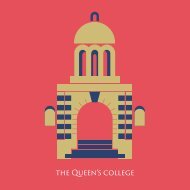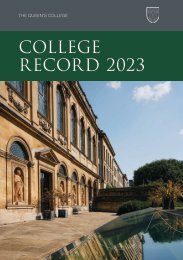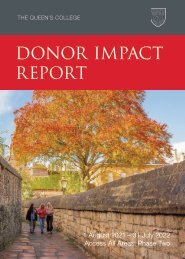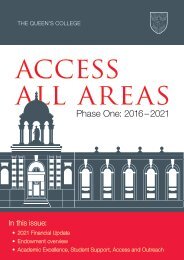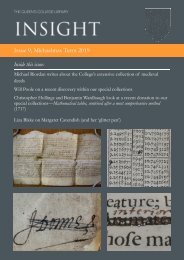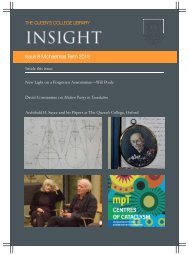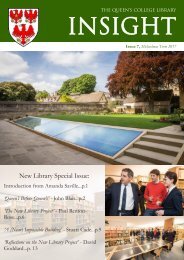The College Record 2022
Create successful ePaper yourself
Turn your PDF publications into a flip-book with our unique Google optimized e-Paper software.
A few years later I returned to Oxford where I was a Junior Research Fellow and<br />
thereafter University Lecturer in the Philosophy of Mathematics, and to my delight<br />
was again a colleague of Brian, though then in the Oxford rather than West Coast<br />
way. We were both members of Freddie Ayer’s Tuesday Group, and I remember<br />
meticulously crafted and deeply insightful papers Brian read to the group, including<br />
“Language and reality in the Tractatus”, and “Philosophy of language and philosophy<br />
of mind in Wittgenstein”.<br />
Obituaries<br />
One of Brian’s very great accomplishments was editing the Vienna Circle Collection,<br />
25 volumes of writings by members of the Vienna Circle, published over a 31-<br />
year period, between 1973 and 2004. This massive and invaluable project was<br />
preceded by Brian’s publication in 1967 of Wittgenstein und der Wiener Kreis from<br />
Waismann’s notes of dictation by Wittgenstein (for which in 1979 he published an<br />
English translation with Joachim Schulte).<br />
In 1981 Brian brought Tscha Hung, the Chinese philosopher who had participated<br />
in meetings of the Vienna Circle in the early 1930s, to Oxford, and Hung attended<br />
meetings of the Tuesday Group. I found him an extraordinarily exotic figure, combining<br />
the Vienna Circle of 50 years earlier with then still very limited western contact with<br />
China. His presence was indicative of Brian’s knowledge of every aspect of the<br />
Vienna Circle. Tscha Hung gave Brian his own copy of the Vienna Circle manifesto,<br />
Wissenschaftlische Weltauffassung: Der Wiener Kreis. Brian kindly allowed me<br />
to photocopy it, with which he included a note, “God knows how it survived the<br />
Cultural Revolution”.<br />
In 1988 Brian published Wittgenstein A Life: Young Ludwig, covering the first 32 of<br />
Wittgenstein’s 63 years, up to publication of the Tractatus. <strong>The</strong> event was celebrated<br />
by a book launch in Blackwell’s at which Colin Haycraft, its publisher, spoke movingly<br />
and amusingly about this long sought and tremendously valued publication (Brian<br />
acknowledged Haycraft in the Preface as “an old friend” who had “shown himself<br />
capable of combining encouragement with infinite patience”). Michael Dummett’s<br />
review, in <strong>The</strong> Tablet, speaks of its “richness and psychological depth” and of its<br />
author as “writing with great understanding and a keen talent for conveying a mood,<br />
an atmosphere, a cast of mind”, and said that Wittgenstein’s philosophy had been<br />
deftly integrated into the narrative in such a way as to provide “just enough of an<br />
account of the philosophy to give the most unprepared reader some sense of what<br />
is going on, and, for the rest, interspersing the narrative with vivid quotations that<br />
convey Wittgenstein’s intense preoccupation with philosophical problems”. In that<br />
same year, Brian left the unique beauty of his Oxford <strong>College</strong> and moved to the<br />
unique beauty of Siena, with two years in between at the Netherlands Institute for<br />
Advanced Study.<br />
In 1999 Brian invited me to give two lectures on Wittgenstein’s philosophy of<br />
mathematics in his seminar in Siena. It was a tremendous privilege to speak on that<br />
<strong>College</strong> <strong>Record</strong> <strong>2022</strong> | <strong>The</strong> Queen’s <strong>College</strong> 117




